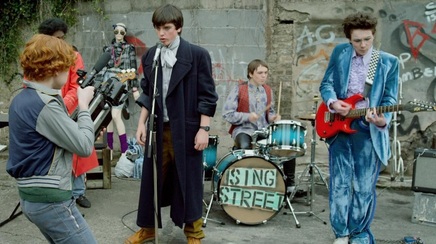Carney appears to have made a semi-autobiographical film about his teenage years, having transferred into Synge Street in the 80's, though he's a little too young to be Conor exactly. It's easy to imagine him in the title role, reckoning with his parents' decaying marriage and navigating a hostile school environment. Of Carney's films, Sing Street feels the most lived-in, packed with specific detail that consistently places the viewer in the bleak Dublin setting. The soundtrack does a lot of the work here, with period staples from Duran Duran and Hall and Oates, but additionally, the cadence of the bullying seems oddly specific and the production team does an excellent job with the apartments and homes that are just a little bit too small. Conor, a cultural vulture, is shown over the course of the film appropriating various looks from the era, trying to find the right image for the band and himself. With the furor over 80's nostalgia in film and TV, it's surprising that Sing Street didn't do better in theaters than it did, because few recent works are as transporting as this one.
The setting is bullet-proof, but Sing Street does its best work in its main characters. Though the rest of the band are mostly ciphers and Eamon is a universally competent problem-solver with none of his own, the trio of Conor, Raphina, and Brendan are all written and portrayed brilliantly. In his acting debut, Walsh-Peelo manages to not only be a credible stage presence and musician, but also the complete opposite, an awkward teenager with difficulty forming a thought that wasn't someone else's first. He organically plays a wide range of emotions, and is a real find for Carney. Boynton's Raphina is also more than just a love interest, occupying a similar space to the female co-protagonist of Once. She's an equal partner to Conor, with equally compelling motivations and goals, and Boynton plays her as a slowly-uncoiling fist, with vulnerability locked under layers of needed self-preservation.
The biggest surprise is Reynor's Brendan, so much more than the stock role of wise mentor. With an early scene in which he explains to Conor why a music video is so groundbreaking, he makes himself worthy of admiration, but Carney slowly undercuts him. Why is this guy with such zeal and intelligence not shown doing anything beyond listening to music in his bathrobe with weeks' worth of stubble? As much a prisoner to his own frustrations as the tanking Irish economy, he brings it all back around with a late explosion, reframing himself as an unwilling and potentially crippled party to his parents' doomed marriage. His baby brother being able to sail in his wake is cold comfort, a fact hammered home by the frequency with which Conor parrots Brendan. Carney dedicates his film to brothers everywhere, and the film does indeed pivot on that fiery monologue from Conor's story to Brendan's, effectively adding a new layer to what had been a standard, if pleasant, coming-of-age tale.
Sing Street is often a joyous delight, even as it stretches the limits of credulity. Could these kids really write what sounds like solid imitations of 80's classics, and then play them to boot? Carney sacrifices trial and error for tonal pleasure, shunning the possibly-staid but definitely-necessary learning period and makes his titular band listenable on day one. It's a hurdle the film never cleared for me, turning the ending from happy to skeptical in a way that was surely not intended. Maybe I underestimate the musical capabilities of Irish Gen-X'ers. I do feel like I have a pretty good handle on Carney's capabilities as a director, placing this squarely in the middle of his big releases. With improved characterization from Begin Again, but nowhere near the effect of Once, Sing Street is Carney on auto-pilot, delivering a sweet and occasionally surprising outing right down the middle. B

 RSS Feed
RSS Feed